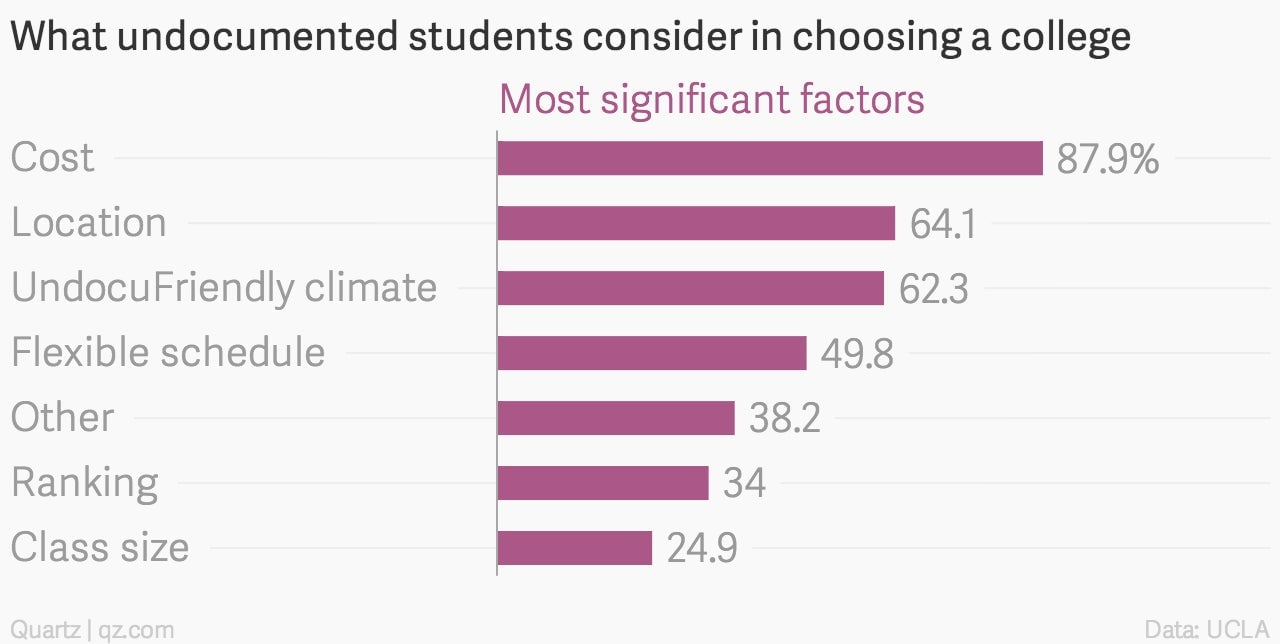Why US colleges should welcome undocumented immigrants
As an undocumented immigrant who moved to California from Mexico as a child, Bianca Rodriguez expected that navigating college would be a challenge, both financially and emotionally. So it was the presence of the Undocumented Student Program that drew Rodriguez to the University of California, Berkeley, where she is now a sophomore.


As an undocumented immigrant who moved to California from Mexico as a child, Bianca Rodriguez expected that navigating college would be a challenge, both financially and emotionally. So it was the presence of the Undocumented Student Program that drew Rodriguez to the University of California, Berkeley, where she is now a sophomore.
The 19-year-old has found the resource center for students who are not in the US legally so helpful that she has become an academic counselor there. ”If I know I have a place where I feel like nobody will judge me,” Rodriguez says, “it becomes easier for me to not only focus on school, but I know I have that support.”
As a high-achieving young undocumented immigrant daunted by the challenges of higher education, Rodriguez is far from alone, according to a new report out of the Institute for Immigration, Globalization, & Education at the University of California, Los Angeles.
As well as the challenge of paying for college—often without in-state tuition or aid—and the stress of illegal status, undocumented undergraduates in the US also find themselves wondering whether a college campus is “undocufriendly.” In other words, is it welcoming to students who are not in the country legally?

The report surveyed about 900 undergraduates throughout the US who identified themselves as undocumented. The students came from 55 countries and attended schools in 34 states. They had lived in the US for an average of 14.8 years.
About two-thirds of the students surveyed could pursue their education with protection from deportation through a program president Barack Obama announced in 2012, Deferred Action for Childhood Arrivals (DACA). The policy protects undocumented young people who meet its criteria from deportation for a limited amount of time, allowing them to take paying jobs and get driver’s licenses In November, Obama announced an expansion of the program by executive action, a move that Republican house speaker John Boehner announced this week he would challenge in court.
There’s a strong argument to be made—as the UCLA institute and the UndocuScholars Project, who put out the report, do—that these undocumented, high-achieving young people are students whose talents are worth nurturing.
“We’re finding that students are majoring in fields that are of great need to the nation,” says Robert Teranishi, a professor of education at UCLA and co-author of the study. Of the students surveyed, 28.2% were majoring STEM fields, an area where the US has a shortage of qualified candidates. That’s a little higher than the national rate (pdf).
And the undocumented students surveyed had better GPAs than US undergraduates as a whole.

The grades were self-reported, and the sample is not necessarily representative of all undocumented youth, says Teranishi. But it makes sense that undocumented students have higher GPAs than the rest of the US, he says. Undocumented students often need scholarship funding or financial aid to attend college, and the bar for holding onto that funding is very high. Those who make it to college in the first place and then remain, he says, are likely the highest-achieving ones.
Indeed, the most significant factors in choosing a college for undocumented students were cost and location. The majority of the respondents—61.3%—reported that their household income was less than $30,000. Currently, 19 states offer in-state tuition or state grant aid to undocumented students attending public universities, while nine states actively restrict undocumented students from in-state tuition or prohibit them from enrolling altogether, according to the report.
And the problems undocumented students face are not just financial and legal. More than half of the students surveyed said they had been mistreated by other students because of their legal status, and many also said they experienced negative or unfair treatment from college representatives.

That’s why programs like the one Rodriguez found at UC Berkeley are so key, the report’s authors say. Rodriguez (who was not herself a part of the study) is a peer academic counselor the Undocumented Student Program, where students are greeted with murals of Martin Luther King and Cesar Chavez and a tree hanging with advice from generations of students.
There she offers other undocumented students both academic and emotional support. “Sometimes,” Rodriguez says, ”you just need somebody else who knows how you feel at that moment, and knows exactly what you’re going through.”